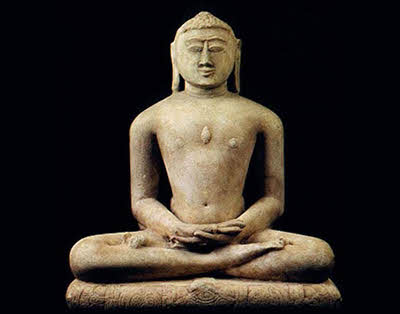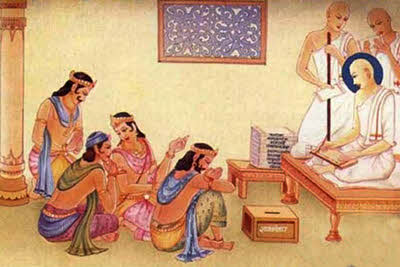
Now the Master Vajranabha acquired strong Tirthankara-bodymaking and family-karma by the twenty sthanakas as follows. Of these the first is by worship of the Arhats and Arhat-statues, and by hymns of praise containing true events, avoiding blasphemy. The second is the celebration in words of the true state of emancipation with festivals of watching in the places where the siddhas attained perfection.
The third sthanaka is kindness to yatis who are young, sick, students, etc., and affection for the scriptures. The fourth sthanaka is the showing of great devotion to gurus by gifts of food, medicine, clothes, etc., and by making salutation. The fifth is devotion to sthaviras, i.e., those who have been initiated for twenty years, those sixty years old, and the learned. The sixth is the showing of affection by gifts of food, clothes, etc., to those having more learning than oneself in regard to interpretation. The seventh is tenderness to ascetics making protracted penance by the gift of devotion and rest.
The eighth is the acquisition of knowledge of both text and meaning of the twelve angas of the scriptures by daily questions, reciting, etc. The ninth is Right-belief, free from the faults of doubt, etc, adorned with the qualities of firmness, etc., characterized by tranquility, etc. The tenth is Reverence (vinaya) socalled from the destruction of karma, fourfold with knowledge, belief, good-conduct, and service to one’s superiors. The eleventh is earnest., determined avoidance of transgression in the modes of conduct and daily duties. The twelfth sthanaka is the observance without sin of the chief gunas of non-injury, etc., and the subsidiary ones of carefulness, etc. The thirteenth sthanaka is the making of pure meditation every minute and every second, with avoidance of negligence.

The fourteenth sthana is constant penance, according to ability, without injury to mind and body. The fifteenth is sharing of food, etc., with ascetics, according to ability, with purity of mind, speech, and body. The sixteenth sthana is the rendering of service by food, drink, etc., to the ten persons, acharya, etc. The seventeenth sthana is enabling the fourfold congregation to concentrate their minds in meditation by warding off all evils. The eighteenth sthana is the daily zealous learning of new texts, interpretations, and both. The nineteenth sthana is devotion to knowledge of the scriptures by faith, by their publication, by destroying censure, etc. The twentieth is the propagation of the doctrine by vidyas, prognostication, literary composition, discussion, discourses on Dharma, etc. Of these (i.e., of the twenty) one is cause for gaining Tirthankaranamakarma.
The Blessed One acquired it by all. Bahu, performing service to the sadhus, acquired for himself karma which had as its fruit the pleasures of a cakravartin. Subahu acquired superhuman strength by giving rest to the great rishis engaged in penance. Then Vajranabha praised Bahu and Subahu, saying, “These are indeed virtuous, bestowing service and rest.” Pitha and Mahapitha reflected, “Whoever confers benefits, he alone is praised. Yet who praises us since we are devoted to the study of the scriptures and meditation, but do not confer benefits? People adhere to those who confer advantages.” Because they did not confess this sin caused by jealousy devoted to deceit and wrong belief, they acquired karma that had woman-birth as its fruit. These six observed their mendicancy free from transgressions, resembling a sword-blade, for fourteen lacs of Purvas. The six, having pure resolution, undertook the first called padapopagamana98 accompanied by the two kinds of Samlekhana, and became chiefgods in the Sarvarthasiddhi heaven, with life-periods of thirty three sagaropamas.














No comments yet.
Leave a comment